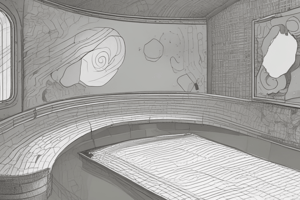Podcast
Questions and Answers
Hermann Ebbinghaus studied the time course of forgetting by analyzing the memory of lists of nonsense syllables at different intervals of time.
Hermann Ebbinghaus studied the time course of forgetting by analyzing the memory of lists of nonsense syllables at different intervals of time.
True (A)
Ebbinghaus found that memory drops within the first two days and then sharply increases after that.
Ebbinghaus found that memory drops within the first two days and then sharply increases after that.
False (B)
Wilhelm Wundt's method of analytic introspection involved participants describing their inner mental processes in response to various stimuli.
Wilhelm Wundt's method of analytic introspection involved participants describing their inner mental processes in response to various stimuli.
True (A)
According to structuralism, experience is composed of complex interactions between thoughts and emotions.
According to structuralism, experience is composed of complex interactions between thoughts and emotions.
William James critiqued introspection as a method due to its high objectivity and ease of verification.
William James critiqued introspection as a method due to its high objectivity and ease of verification.
James' description of attention emphasized the overwhelming amount of sensory input that does not form part of conscious experience.
James' description of attention emphasized the overwhelming amount of sensory input that does not form part of conscious experience.
Wilhelm Wundt proposed the theory of subtractive logic in cognitive psychology.
Wilhelm Wundt proposed the theory of subtractive logic in cognitive psychology.
Ebbinghaus' forgetting curve refers to the tendency of the mind to retain more information over time.
Ebbinghaus' forgetting curve refers to the tendency of the mind to retain more information over time.
John Watson's proposal of behaviorism involved focusing on 'objectively' observable behavior as a response to stimuli.
John Watson's proposal of behaviorism involved focusing on 'objectively' observable behavior as a response to stimuli.
Cognitive psychology pioneers abandoned the study of the mind because they considered mental processes as unscientific.
Cognitive psychology pioneers abandoned the study of the mind because they considered mental processes as unscientific.
Structuralism in psychology emphasizes understanding the structure of the human mind through introspection.
Structuralism in psychology emphasizes understanding the structure of the human mind through introspection.
Donders' subtractive logic refers to the process of adding mental tasks together to measure cognitive load.
Donders' subtractive logic refers to the process of adding mental tasks together to measure cognitive load.
Ebbinghaus' forgetting curve demonstrates that we forget information quickly if we do not review it frequently.
Ebbinghaus' forgetting curve demonstrates that we forget information quickly if we do not review it frequently.
Donders' subtractive logic involves measuring mental processes by adding different tasks together.
Donders' subtractive logic involves measuring mental processes by adding different tasks together.
Wilhelm Wundt's psychological laboratory was established in the 19th century.
Wilhelm Wundt's psychological laboratory was established in the 19th century.
Structuralism in psychology focuses on understanding the structure of the human brain through direct observation.
Structuralism in psychology focuses on understanding the structure of the human brain through direct observation.
Measuring mental processes through behavior means that we can directly observe mental functions.
Measuring mental processes through behavior means that we can directly observe mental functions.
Cognitive psychology emerged as an academic discipline in the 19th century.
Cognitive psychology emerged as an academic discipline in the 19th century.
Flashcards are hidden until you start studying
Study Notes
Hermann Ebbinghaus and Memory
- Studied forgetting by analyzing memory retention of nonsense syllables over time.
- Found significant memory drop within the first two days followed by a slower decline.
- Introduced the concept of the forgetting curve, demonstrating the rapid loss of information without reinforcement.
Wilhelm Wundt and Introspection
- Developed the method of analytic introspection, where participants describe internal thoughts in response to stimuli.
- Advocated for structuralism, exploring complex interactions of thoughts and emotions in experiences.
- Established the first psychological laboratory in the 19th century, marking a pivotal moment in psychology.
William James and Attention
- Critiqued introspection for lacking objectivity and verifiability, promoting a more empirical approach.
- Emphasized that the mind filters a vast amount of sensory information, with only a fraction reaching conscious awareness.
Cognitive Psychology Development
- Pioneers of cognitive psychology moved away from studying the mind due to perceptions of it as unscientific.
- Emerged as an academic discipline in the 19th century, focusing on mental processes beyond mere behavior.
- Introduced techniques like measuring cognitive load using Donders' subtractive logic, which adds tasks to assess mental processing.
Behaviorism
- John Watson introduced behaviorism, focusing exclusively on observable behaviors as responses to stimuli, ignoring internal mental processes.
- This shift highlighted a contrast with earlier psychological approaches that emphasized introspection and subjective experience.
Studying That Suits You
Use AI to generate personalized quizzes and flashcards to suit your learning preferences.



